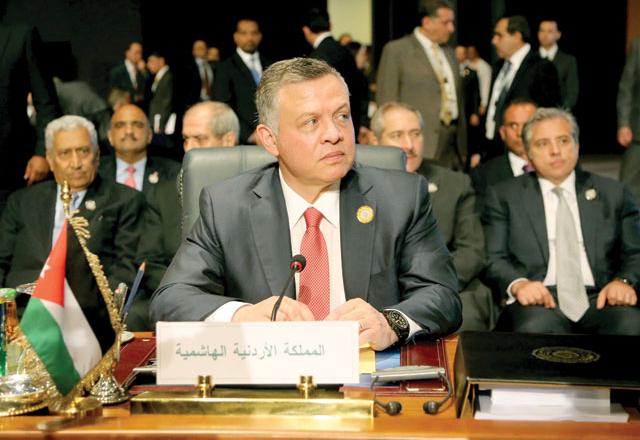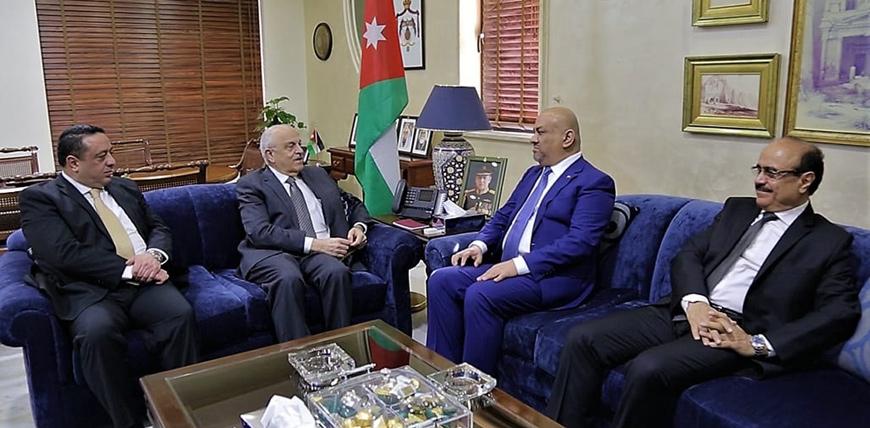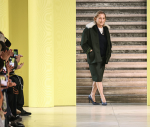You are here
Jordan ‘fully committed to defending Yemen’s legitimacy, fighting foreign interference’
By Mohammad Ghazal - Mar 29,2015 - Last updated at Mar 29,2015

SHARM EL SHEIKH — His Majesty King Abdullah has said Jordan is fully committed to the Arab military effort in Yemen to support Yemen’s legitimate leadership, its people and uproot foreign interference in Yemen’s internal affairs — an interference that serves expansionist powers and brings Yemen and its people no good.
"We will continue to stand by our brotherly country and its legitimate leadership... Our aim is to ensure Yemen’s stability, preserve its political independence, enhance its security, preserve its territorial integrity, protect its borders and guarantee that there are no threats to neighbouring countries, especially brotherly Arab countries of the Gulf, whose security is integral to the security of the Hashemite Kingdom of Jordan, and we reject any attempt to compromise it," King Abdullah said in an address at the Arab Summit read on his behalf by Prime Minister Abdullah Ensour (see full text).
His Majesty noted that the military operation was initiated in response to an official request made by Yemen’s legitimate and constitutional authority to the Arab League and the United Nations Security Council, in line with the Arab Joint Defence Treaty and Article 51 of the Charter of the United Nations. He said Jordan looks forward to seeing Yemen overcome its current situation and to preserve its national unity, sovereignty and achievements.
“We stress on Jordan’s full support for the GCC’s initiative on Yemen and its executive mechanisms and national dialogue efforts under President [Abed Rabbo Mansour] Hadi. Jordan condemns all forms of terrorism targeting Yemeni people and Yemen’s social fabric,” the King said at the summit attended by 14 Arab leaders at Sharm El Sheikh.
Calling for collective pan-Arab efforts to achieve a comprehensive Arab strategy to address the growing dangers of terrorism and sectarian and political violence, which aim to distort the true image of our faith and its message of peace, the Monarch said the “war on terrorism and extremism is our war”.
“It is a war in which we, Muslims, defend our faith and its ideals against terrorist groups that have nothing to do with Islam and seek to undermine the security and future of the Arab nation. Accordingly, we need to adopt a holistic approach to defeat and uproot this new breed of Khawarij. This approach should entail military, security, social, educational and cultural efforts among others. It is complemented by policies and resources made available to fight marginalisation, poverty, exclusion and creating jobs for our youth,” said the King.
In order to dispel terrorists’ ideology, scholars, intellectuals and opinion leaders must assume their responsibility in formulating discourses in the fields of religion, media and culture that seek enlightenment and reflect Islam’s true principles of moderation, openness and tolerance. This effort is necessary to refute the false claims of deviant groups against our true religion and enhance the role of the media in fighting the lies these Khawarij are spreading, he said.
“Because this war is our war, we, Muslims and Arabs, must unite our efforts and lead an Arab-Muslim coalition to face terrorism and confront all forms of Islamophobia, which feed religious extremism,” said King Abdullah.
In his address, King Abdullah said the Palestinian cause is the core conflict in the Middle East.
“It is the key to addressing all regional issues. It encompasses the rights of the Palestinian people to achieve their legitimate aspirations to establish an independent, sovereign and viable state on national Palestinian soil on the lines of June 4, 1967, with East Jerusalem as its capital, based on the two-state solution, international resolutions and the Arab Peace Initiative, which together compose the basis to end the Palestinian-Israeli conflict and achieve comprehensive peace in the Middle East,” he said.
“We urgently call on the international community and world powers to concentrate efforts on resuming serious negotiations, leading to a just and permanent settlement to the Palestinian-Israeli conflict, in order to allow our region to embark on building a secure and stable future. Otherwise, our legitimate cause will continue to get used as a rallying call for forces that do not seek our people’s interests, but their interests at the expense of Palestinians,” said the King.
His Majesty added that Jordan affirms its commitment to protect and preserve the Islamic and Christen holy sites and confront all actions that seek to violate their sanctity or infringe on their status, stressing that Jordan will continue to encourage the international community to fulfil its responsibilities to end grave Israeli violations in the holy city, particularly Al Aqsa Mosque Compound — Al Haram Al Sharif.
The Monarch warned that the continuation of these violations thwart peace efforts. Equally, Jordan will always uphold the historical, religious and national responsibility to preserve the Arab identity of Jerusalem and support its people’s resistance, he said.
On Syria, the King reiterated Jordan’s call for a comprehensive political solution that fulfils the demands of the Syrian people and ensures the inclusion and participation of all components of Syrian society in charting their future.
On Iraq, the King said Arab countries should also support the efforts being led by the Iraqi government and people to counter terrorism and uproot criminal gangs and organisations from Iraq. Participation of all components of the Iraqi people and their real and continued inclusion is a key requirement for the success of these efforts.
Referring to the escalating situation in Iraq, the King stressed the importance of commitment to support its efforts to enroot sovereignty, security and stability.
He also called for supporting Libya’s institution-building efforts and its elected national parliament and the government that emerged from it, which represent the foundations of legitimacy.
On the sidelines of the summit, King Abdullah held several separate meetings with Arab leaders, according to a Royal Court statement.
At a meeting with Egypt’s President Abdel Fattah Al Sisi, the two leaders underlined the need for intensified efforts to face the challenges facing some Arab countries at present, especially Yemen.
The two leaders urged more efforts to revive the peace talks between the Palestinians and the Israelis, leading to the creation of an independent Palestinian state in line with the relevant international resolutions and the Arab Peace Initiative. Talks also covered the situation in Syria, Iraq and Libya.
His Majesty also met with King of Bahrain Hamad Bin Isa Al Khalifa, where they urged developing a unified Arab stance to face extremism and combat terrorist gangs, and deal with challenges in the region, especially in Yemen.
On Syria, King Abdullah called for a political solution that preserves the unity of the country and ends the bloodshed.
At a meeting with Iraqi President Fouad Masoum, King Abdullah voiced support for Iraq and efforts to safeguard its security and stability. Discussions also focused on regional and international efforts to combat terrorism and face terrorist ideologies.
His Majesty also held separate meetings with President Ismail Omar Guelleh of Djibouti and Somali President Hassan Sheikh Mohamud, where they discussed cooperation, regional developments and means to activate joint Arab work.
Related Articles
AMMAN — The 28th Arab summit meeting held on Wednesday at the Dead Sea concluded with a message of peace, full support for Palestine and a c
AMMAN — Deputy Prime Minister Rajai Muasher on Sunday received Yemen’s Foreign Affairs Minister Khalid Yamani, the Jordan News Agency, Petra
AMMAN — A joint communiqué was issued on Tuesday on the occasion of Saudi King Salman Bin Abdulaziz Al Saud’s state visit to the Kingdom, up

Opinion
Apr 09, 2025
Apr 08, 2025
- Popular
- Rated
- Commented
Apr 08, 2025
Apr 09, 2025
Newsletter
Get top stories and blog posts emailed to you each day.
















